
aiohttp
Asynchronous HTTP client/server framework for asyncio and Python
Stars: 15451
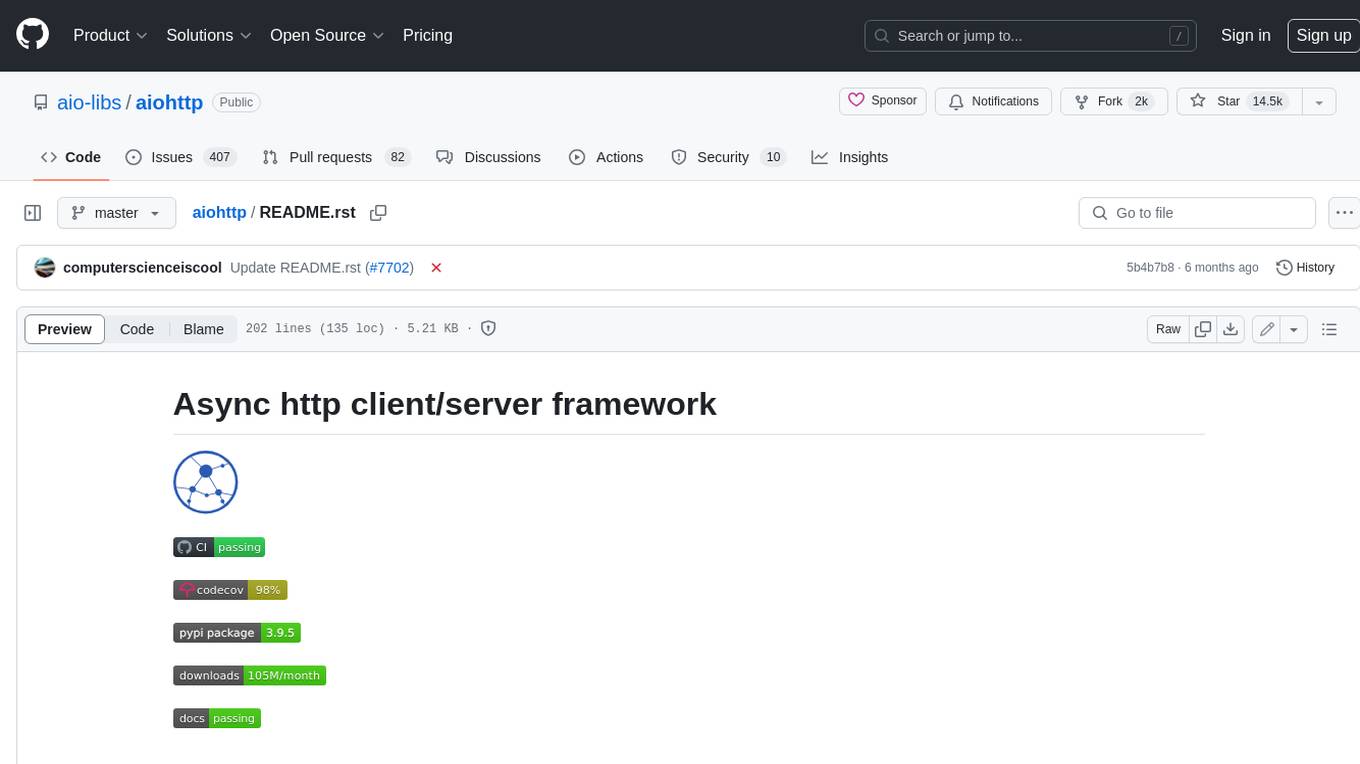
aiohttp is an async http client/server framework that supports both client and server side of HTTP protocol. It also supports both client and server Web-Sockets out-of-the-box and avoids Callback Hell. aiohttp provides a Web-server with middleware and pluggable routing.
README:
.. image:: https://raw.githubusercontent.com/aio-libs/aiohttp/master/docs/aiohttp-plain.svg :height: 64px :width: 64px :alt: aiohttp logo
|
.. image:: https://github.com/aio-libs/aiohttp/workflows/CI/badge.svg :target: https://github.com/aio-libs/aiohttp/actions?query=workflow%3ACI :alt: GitHub Actions status for master branch
.. image:: https://codecov.io/gh/aio-libs/aiohttp/branch/master/graph/badge.svg :target: https://codecov.io/gh/aio-libs/aiohttp :alt: codecov.io status for master branch
.. image:: https://img.shields.io/endpoint?url=https://codspeed.io/badge.json :target: https://codspeed.io/aio-libs/aiohttp :alt: Codspeed.io status for aiohttp
.. image:: https://badge.fury.io/py/aiohttp.svg :target: https://pypi.org/project/aiohttp :alt: Latest PyPI package version
.. image:: https://img.shields.io/pypi/dm/aiohttp :target: https://pypistats.org/packages/aiohttp :alt: Downloads count
.. image:: https://readthedocs.org/projects/aiohttp/badge/?version=latest :target: https://docs.aiohttp.org/ :alt: Latest Read The Docs
.. image:: https://img.shields.io/matrix/aio-libs:matrix.org?label=Discuss%20on%20Matrix%20at%20%23aio-libs%3Amatrix.org&logo=matrix&server_fqdn=matrix.org&style=flat :target: https://matrix.to/#/%23aio-libs:matrix.org :alt: Matrix Room — #aio-libs:matrix.org
.. image:: https://img.shields.io/matrix/aio-libs-space:matrix.org?label=Discuss%20on%20Matrix%20at%20%23aio-libs-space%3Amatrix.org&logo=matrix&server_fqdn=matrix.org&style=flat :target: https://matrix.to/#/%23aio-libs-space:matrix.org :alt: Matrix Space — #aio-libs-space:matrix.org
- Supports both client and server side of HTTP protocol.
- Supports both client and server Web-Sockets out-of-the-box and avoids Callback Hell.
- Provides Web-server with middleware and pluggable routing.
To get something from the web:
.. code-block:: python
import aiohttp import asyncio
async def main():
async with aiohttp.ClientSession() as session:
async with session.get('http://python.org') as response:
print("Status:", response.status)
print("Content-type:", response.headers['content-type'])
html = await response.text()
print("Body:", html[:15], "...")
asyncio.run(main())
This prints:
.. code-block::
Status: 200
Content-type: text/html; charset=utf-8
Body: <!doctype html> ...
Coming from requests <https://requests.readthedocs.io/>_ ? Read why we need so many lines <https://aiohttp.readthedocs.io/en/latest/http_request_lifecycle.html>_.
An example using a simple server:
.. code-block:: python
# examples/server_simple.py
from aiohttp import web
async def handle(request):
name = request.match_info.get('name', "Anonymous")
text = "Hello, " + name
return web.Response(text=text)
async def wshandle(request):
ws = web.WebSocketResponse()
await ws.prepare(request)
async for msg in ws:
if msg.type == web.WSMsgType.text:
await ws.send_str("Hello, {}".format(msg.data))
elif msg.type == web.WSMsgType.binary:
await ws.send_bytes(msg.data)
elif msg.type == web.WSMsgType.close:
break
return ws
app = web.Application()
app.add_routes([web.get('/', handle),
web.get('/echo', wshandle),
web.get('/{name}', handle)])
if __name__ == '__main__':
web.run_app(app)
https://aiohttp.readthedocs.io/
https://github.com/aio-libs/aiohttp-demos
-
Third party libraries <http://aiohttp.readthedocs.io/en/latest/third_party.html>_ -
Built with aiohttp <http://aiohttp.readthedocs.io/en/latest/built_with.html>_ -
Powered by aiohttp <http://aiohttp.readthedocs.io/en/latest/powered_by.html>_
Feel free to make a Pull Request for adding your link to these pages!
aio-libs Discussions: https://github.com/aio-libs/aiohttp/discussions
Matrix: #aio-libs:matrix.org <https://matrix.to/#/#aio-libs:matrix.org>_
We support Stack Overflow <https://stackoverflow.com/questions/tagged/aiohttp>_.
Please add aiohttp tag to your question there.
- multidict_
- yarl_
- frozenlist_
Optionally you may install the aiodns_ library (highly recommended for sake of speed).
.. _aiodns: https://pypi.python.org/pypi/aiodns .. _multidict: https://pypi.python.org/pypi/multidict .. _frozenlist: https://pypi.org/project/frozenlist/ .. _yarl: https://pypi.python.org/pypi/yarl
aiohttp is offered under the Apache 2 license.
The aiohttp community would like to thank Keepsafe (https://www.getkeepsafe.com) for its support in the early days of the project.
The latest developer version is available in a GitHub repository: https://github.com/aio-libs/aiohttp
If you are interested in efficiency, the AsyncIO community maintains a list of benchmarks on the official wiki: https://github.com/python/asyncio/wiki/Benchmarks
For Tasks:
Click tags to check more tools for each tasksFor Jobs:
Alternative AI tools for aiohttp
Similar Open Source Tools

aiohttp
aiohttp is an async http client/server framework that supports both client and server side of HTTP protocol. It also supports both client and server Web-Sockets out-of-the-box and avoids Callback Hell. aiohttp provides a Web-server with middleware and pluggable routing.
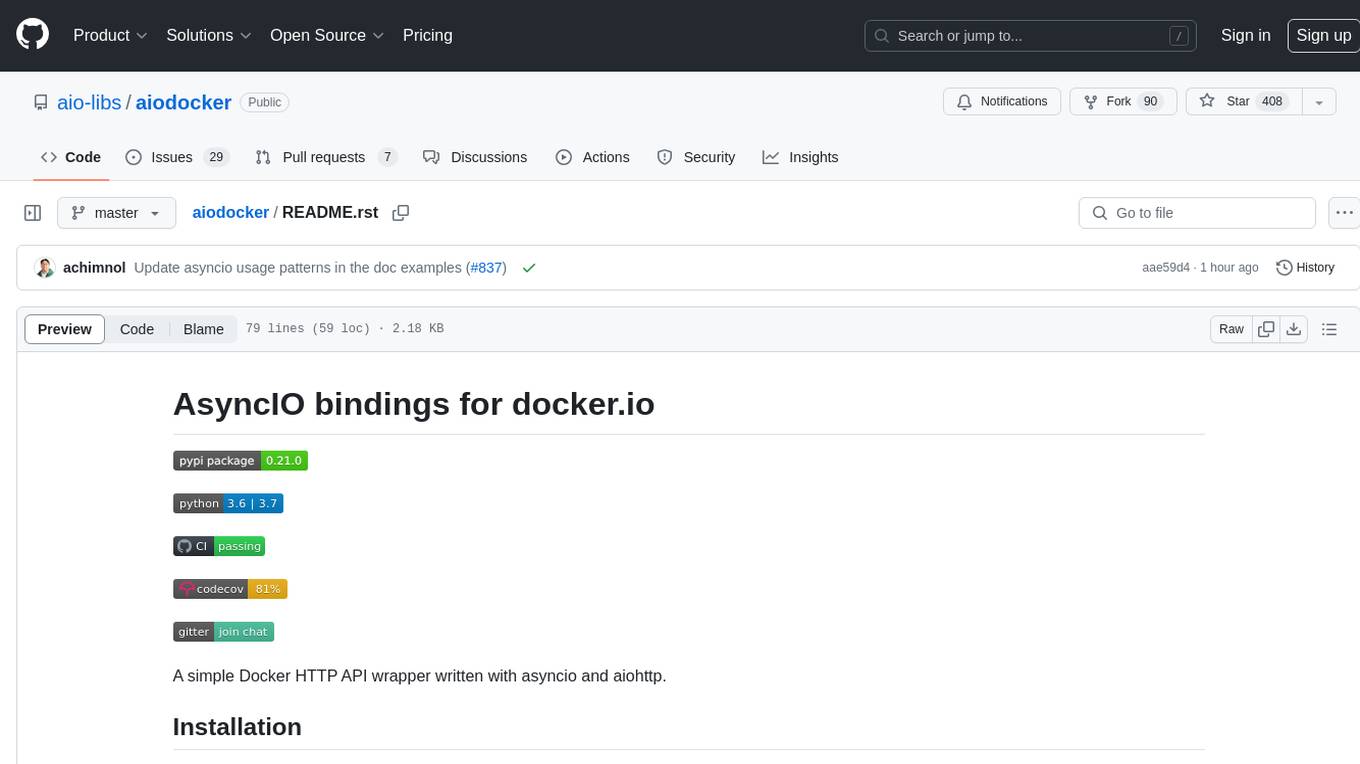
aiodocker
Aiodocker is a simple Docker HTTP API wrapper written with asyncio and aiohttp. It provides asynchronous bindings for interacting with Docker containers and images. Users can easily manage Docker resources using async functions and methods. The library offers features such as listing images and containers, creating and running containers, and accessing container logs. Aiodocker is designed to work seamlessly with Python's asyncio framework, making it suitable for building asynchronous Docker management applications.
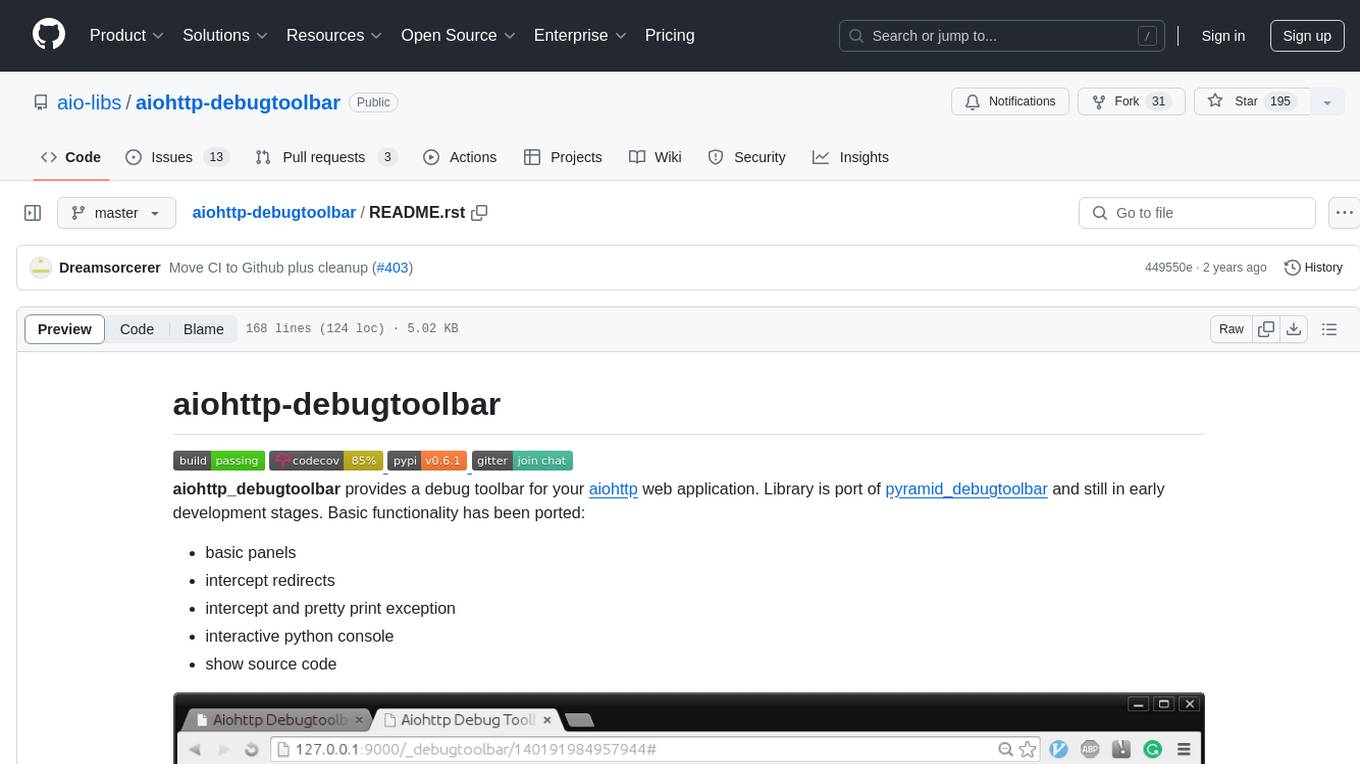
aiohttp-debugtoolbar
aiohttp_debugtoolbar provides a debug toolbar for aiohttp web applications. It is a port of pyramid_debugtoolbar and offers basic functionality such as basic panels, intercepting redirects, pretty printing exceptions, an interactive python console, and showing source code. The library is still in early development stages and offers various debug panels for monitoring different aspects of the web application. It is a useful tool for developers working with aiohttp to debug and optimize their applications.
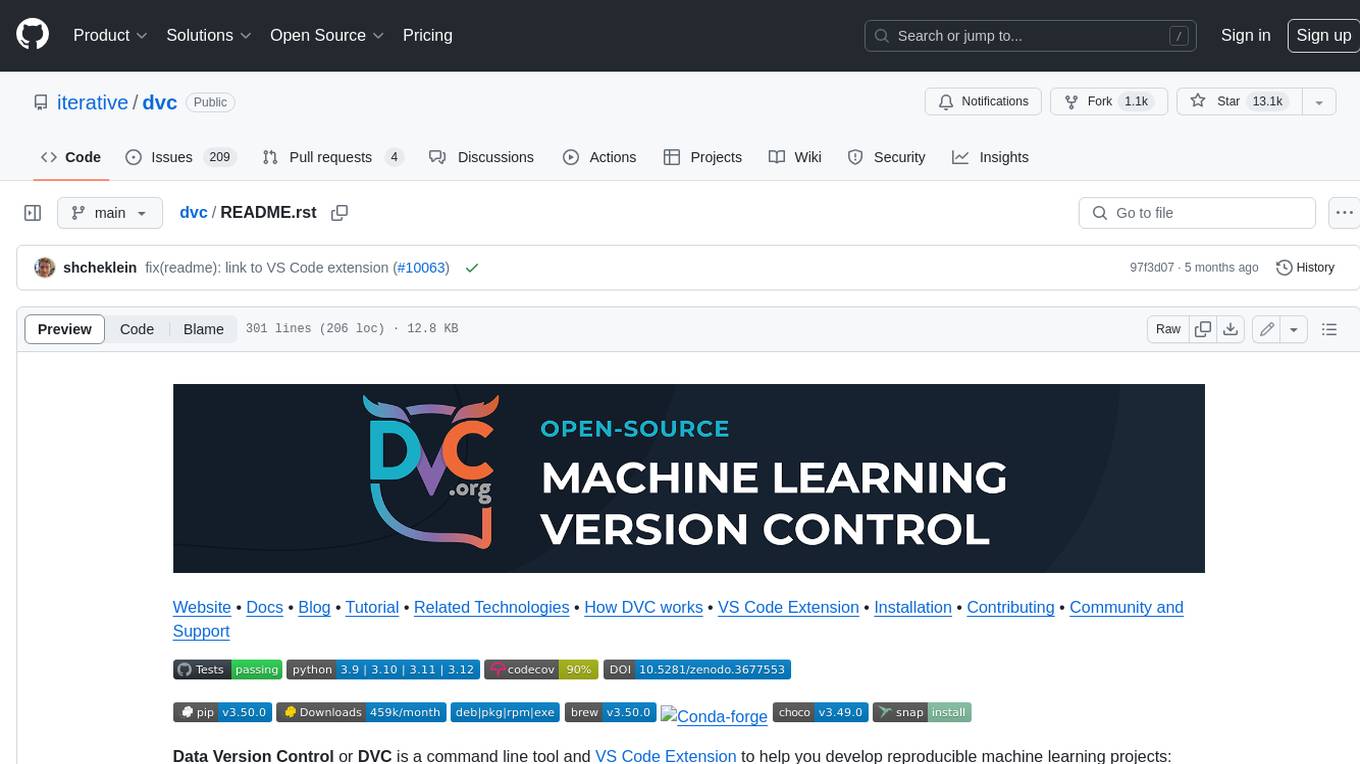
dvc
DVC, or Data Version Control, is a command-line tool and VS Code extension that helps you develop reproducible machine learning projects. With DVC, you can version your data and models, iterate fast with lightweight pipelines, track experiments in your local Git repo, compare any data, code, parameters, model, or performance plots, and share experiments and automatically reproduce anyone's experiment.
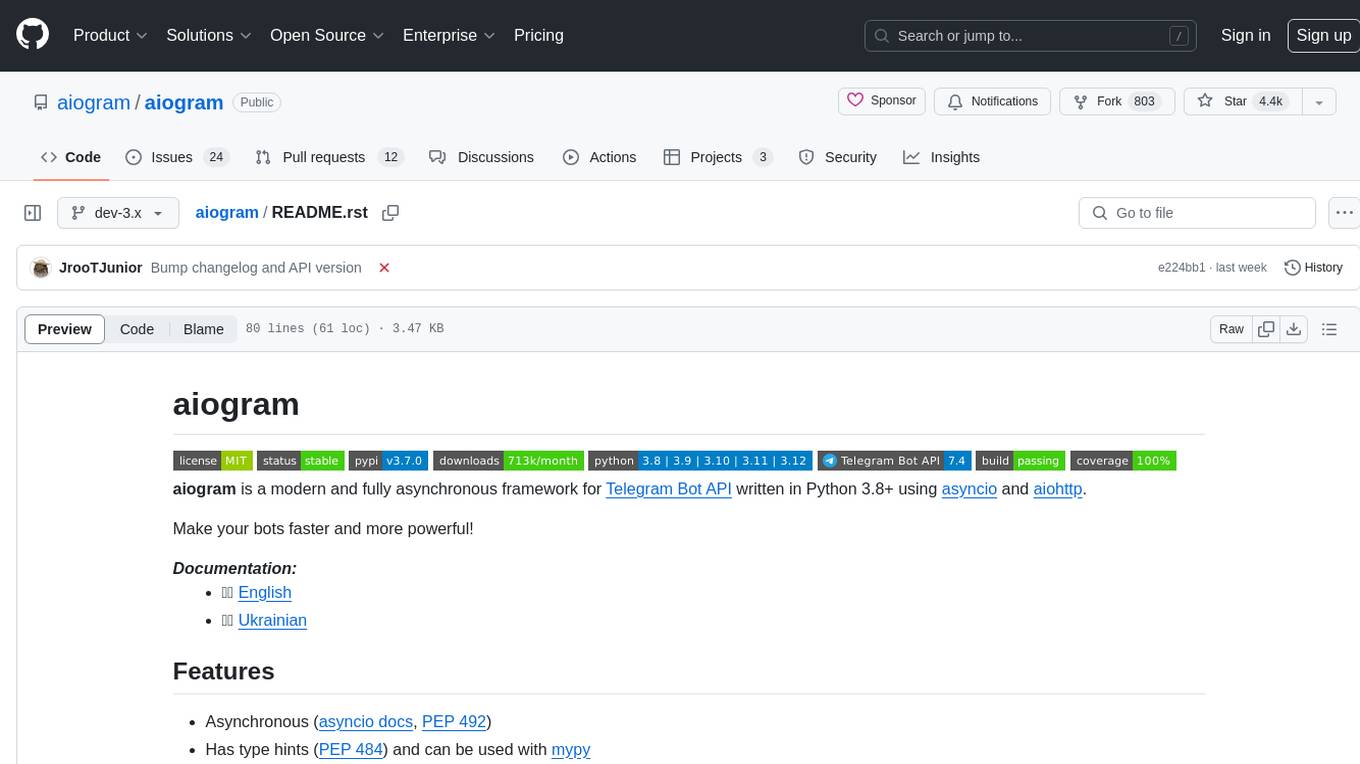
aiogram
aiogram is a modern and fully asynchronous framework for Telegram Bot API written in Python 3.8+ using asyncio and aiohttp. It helps users create faster and more powerful bots. The framework supports features such as asynchronous operations, type hints, PyPy support, Telegram Bot API integration, router updates, Finite State Machine, magic filters, middlewares, webhook replies, and I18n/L10n support with GNU Gettext or Fluent. Prior experience with asyncio is recommended before using aiogram.
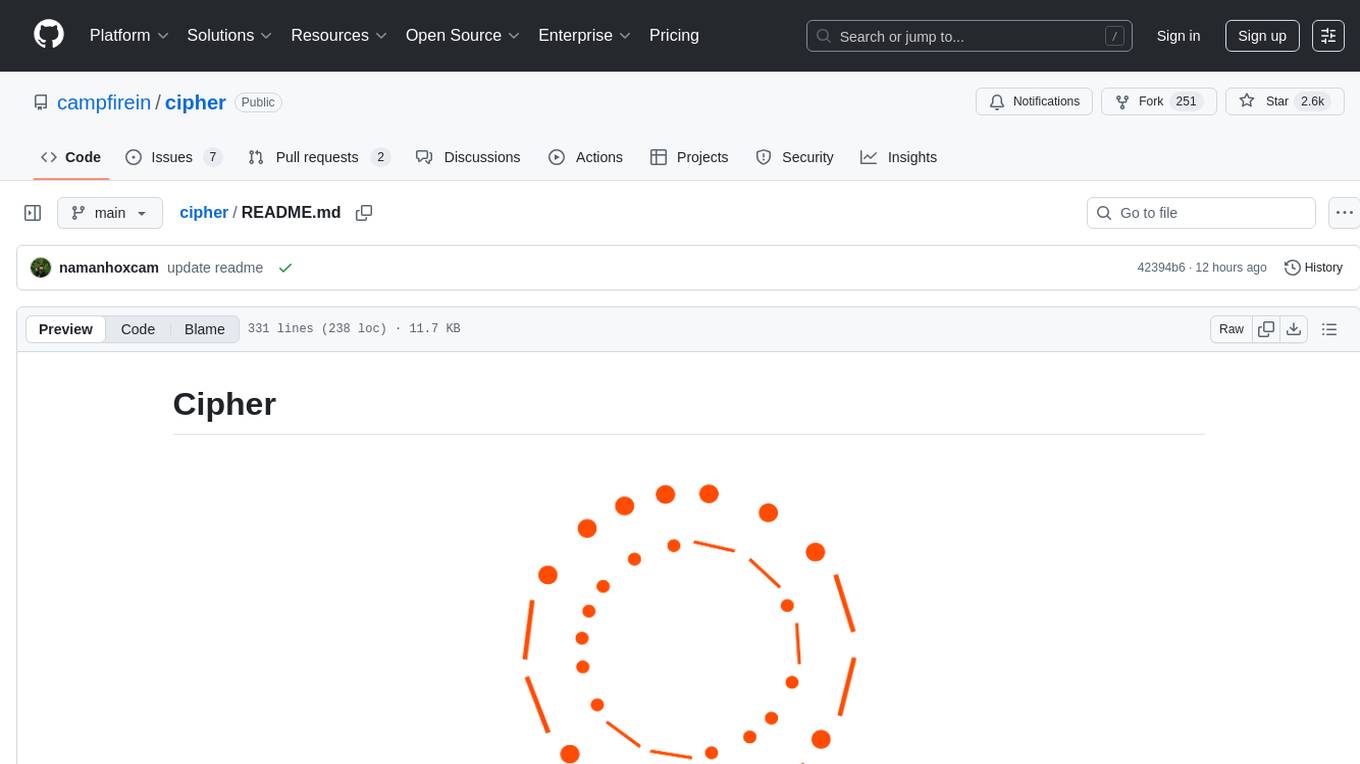
cipher
Cipher is a versatile encryption and decryption tool designed to secure sensitive information. It offers a user-friendly interface with various encryption algorithms to choose from, ensuring data confidentiality and integrity. With Cipher, users can easily encrypt text or files using strong encryption methods, making it suitable for protecting personal data, confidential documents, and communication. The tool also supports decryption of encrypted data, providing a seamless experience for users to access their secured information. Cipher is a reliable solution for individuals and organizations looking to enhance their data security measures.
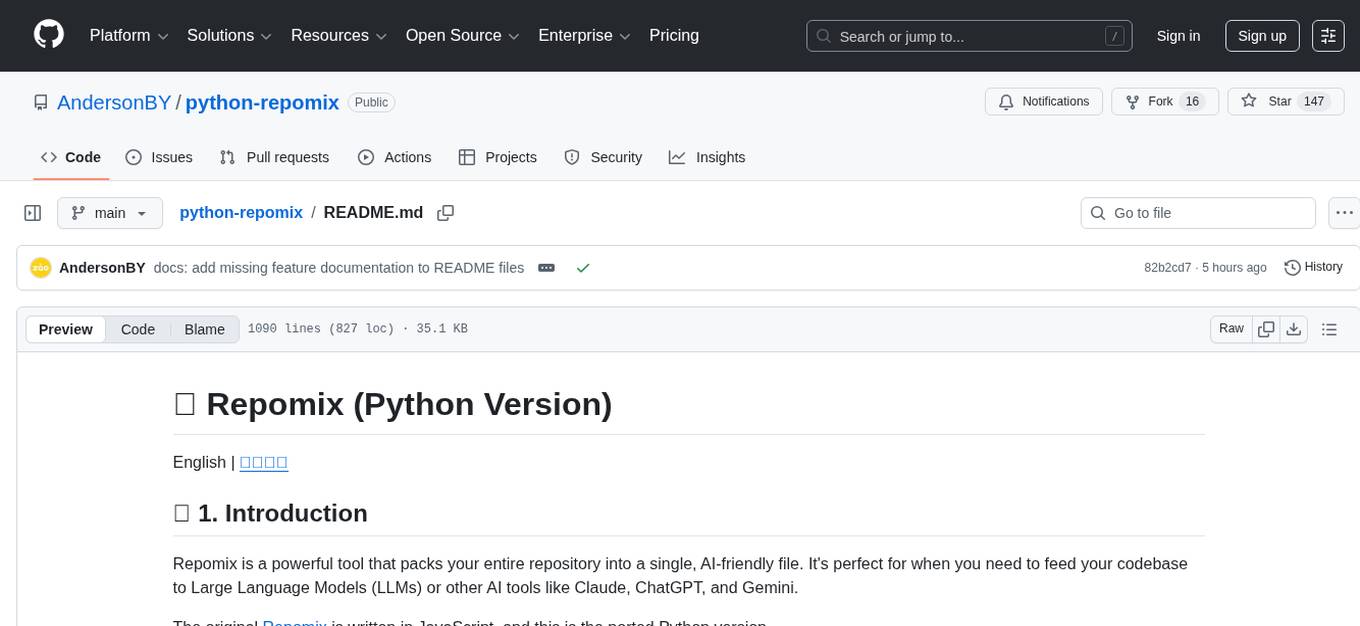
python-repomix
Repomix is a powerful tool that packs your entire repository into a single, AI-friendly file. It formats your codebase for easy AI comprehension, provides token counts, is simple to use with one command, customizable, git-aware, security-focused, and offers advanced code compression. It supports multiprocessing or threading for faster analysis, automatically handles various file encodings, and includes built-in security checks. Repomix can be used with uvx, pipx, or Docker. It offers various configuration options for output style, security checks, compression modes, ignore patterns, and remote repository processing. The tool can be used for code review, documentation generation, test case generation, code quality assessment, library overview, API documentation review, code architecture analysis, and configuration analysis. Repomix can also run as an MCP server for AI assistants like Claude, providing tools for packaging codebases, reading output files, searching within outputs, reading files from the filesystem, listing directory contents, generating Claude Agent Skills, and more.
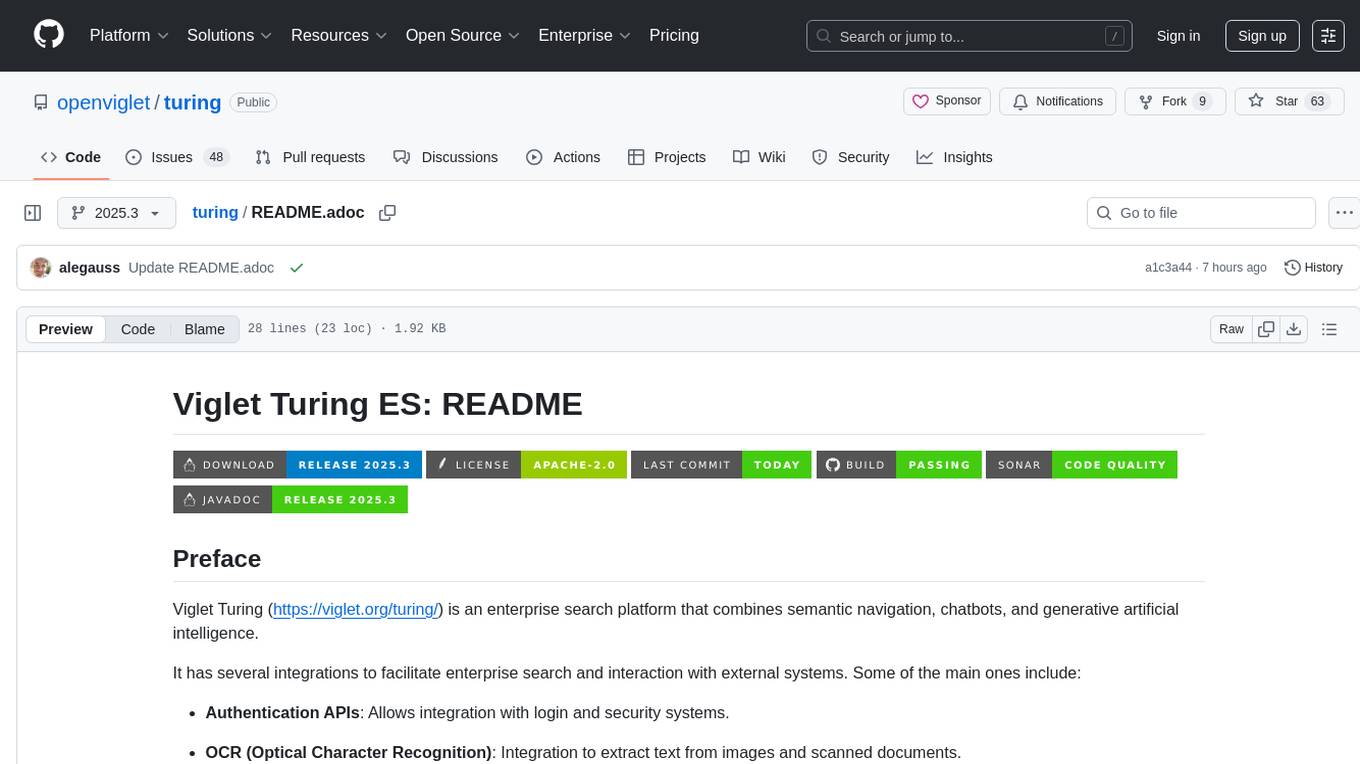
turing
Viglet Turing is an enterprise search platform that combines semantic navigation, chatbots, and generative artificial intelligence. It offers integrations for authentication APIs, OCR, content indexing, CMS connectors, web crawling, database connectors, and file system indexing.
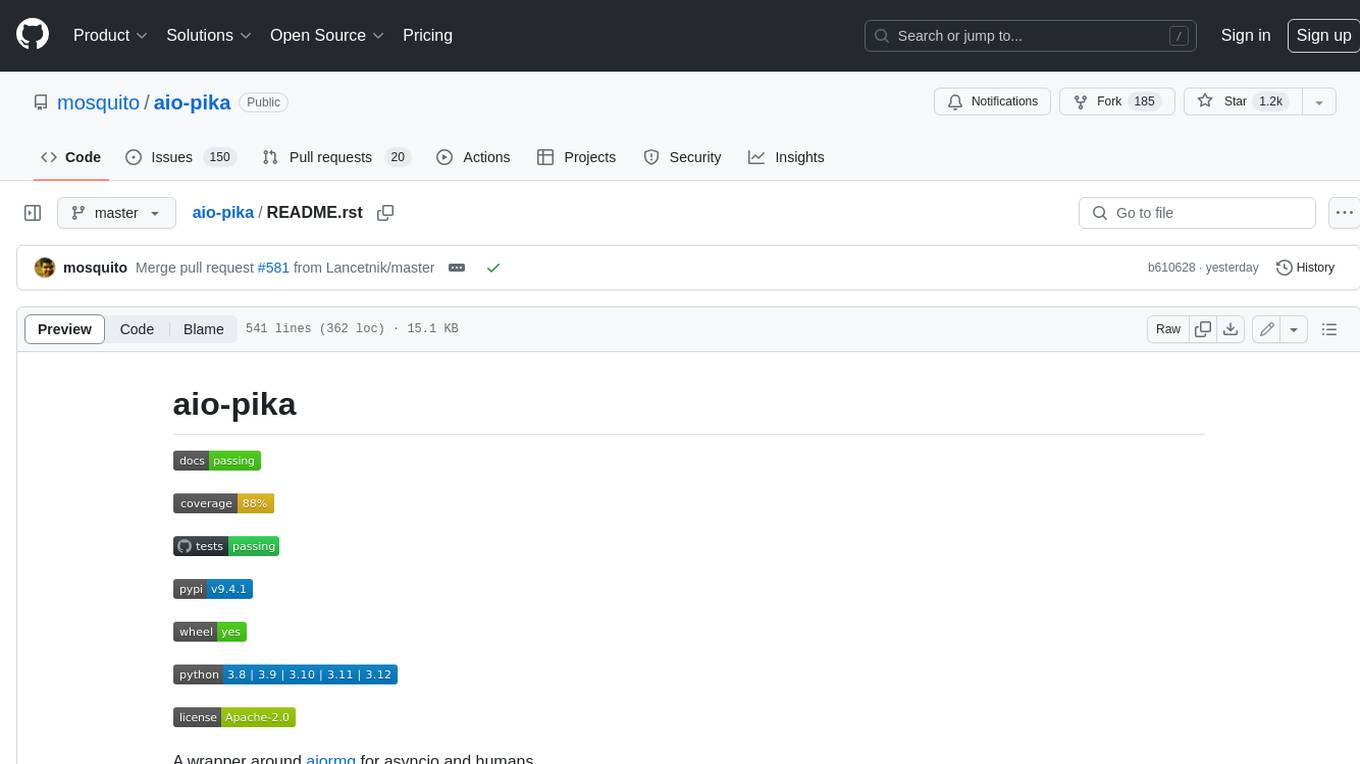
aio-pika
Aio-pika is a wrapper around aiormq for asyncio and humans. It provides a completely asynchronous API, object-oriented API, transparent auto-reconnects with complete state recovery, Python 3.7+ compatibility, transparent publisher confirms support, transactions support, and complete type-hints coverage.

aiohttp-pydantic
Aiohttp pydantic is an aiohttp view to easily parse and validate requests. You define using function annotations what your methods for handling HTTP verbs expect, and Aiohttp pydantic parses the HTTP request for you, validates the data, and injects the parameters you want. It provides features like query string, request body, URL path, and HTTP headers validation, as well as Open API Specification generation.

aiomysql
aiomysql is a driver for accessing a MySQL database from the asyncio framework. It is based on PyMySQL and aims to provide the same API and functionality. Internally, aiomysql is a modified version of PyMySQL with async IO calls. It supports SQLAlchemy integration and offers a familiar experience for aiopg users.
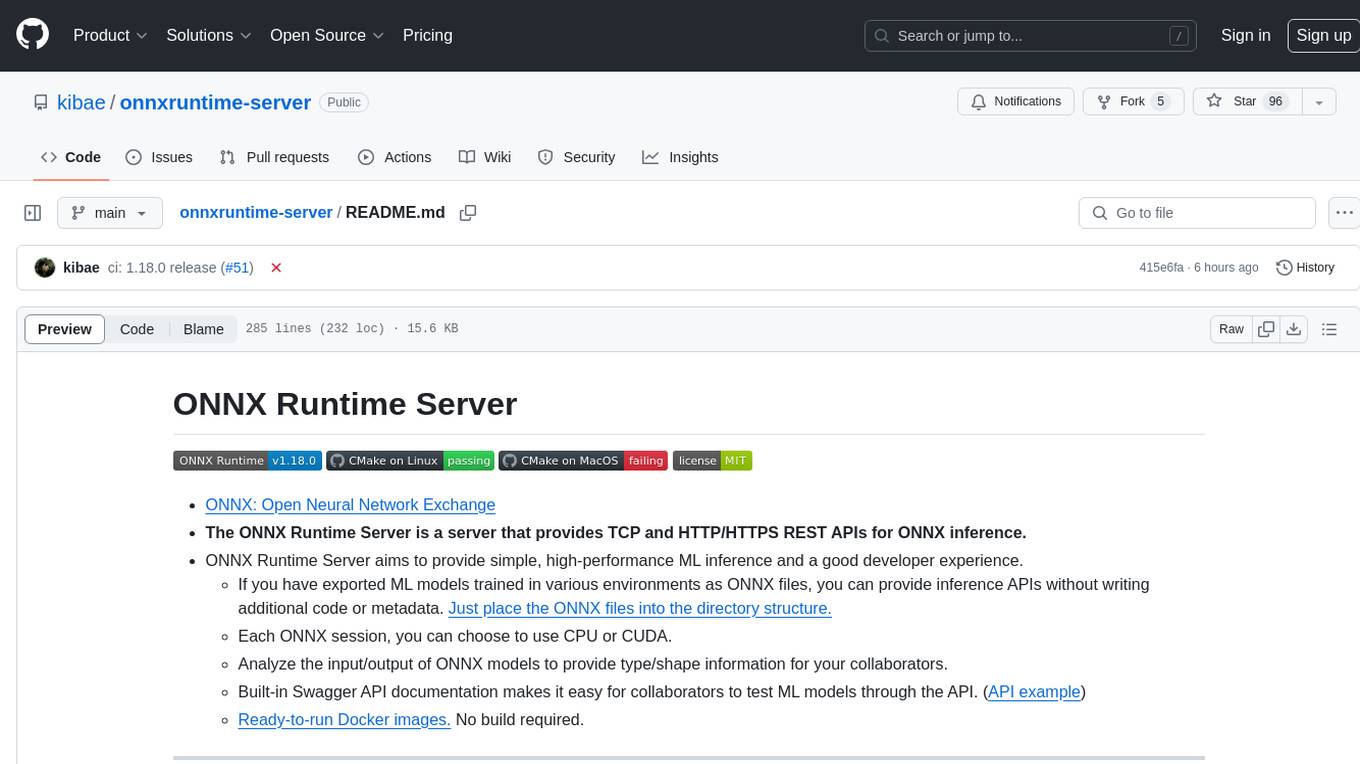
onnxruntime-server
ONNX Runtime Server is a server that provides TCP and HTTP/HTTPS REST APIs for ONNX inference. It aims to offer simple, high-performance ML inference and a good developer experience. Users can provide inference APIs for ONNX models without writing additional code by placing the models in the directory structure. Each session can choose between CPU or CUDA, analyze input/output, and provide Swagger API documentation for easy testing. Ready-to-run Docker images are available, making it convenient to deploy the server.
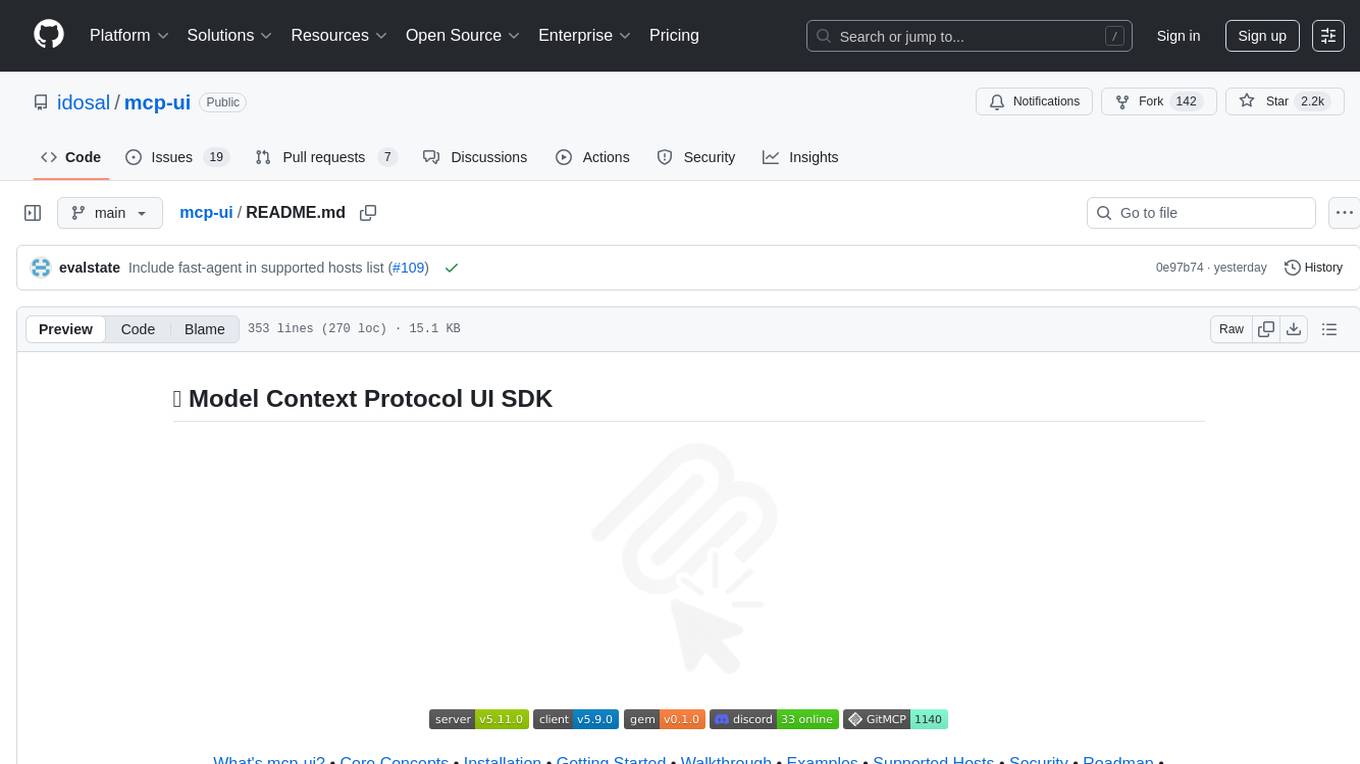
mcp-ui
mcp-ui is a collection of SDKs that bring interactive web components to the Model Context Protocol (MCP). It allows servers to define reusable UI snippets, render them securely in the client, and react to their actions in the MCP host environment. The SDKs include @mcp-ui/server (TypeScript) for generating UI resources on the server, @mcp-ui/client (TypeScript) for rendering UI components on the client, and mcp_ui_server (Ruby) for generating UI resources in a Ruby environment. The project is an experimental community playground for MCP UI ideas, with rapid iteration and enhancements.
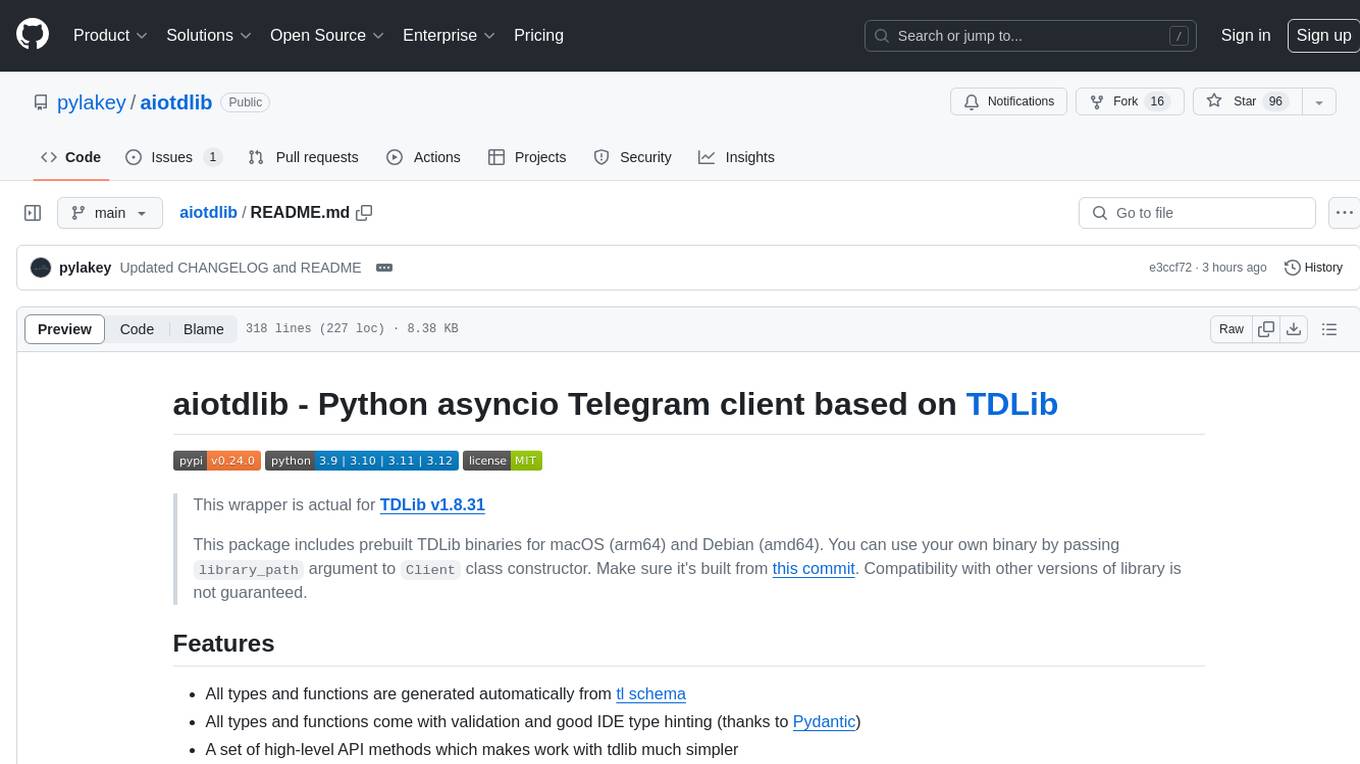
aiotdlib
aiotdlib is a Python asyncio Telegram client based on TDLib. It provides automatic generation of types and functions from tl schema, validation, good IDE type hinting, and high-level API methods for simpler work with tdlib. The package includes prebuilt TDLib binaries for macOS (arm64) and Debian Bullseye (amd64). Users can use their own binary by passing `library_path` argument to `Client` class constructor. Compatibility with other versions of the library is not guaranteed. The tool requires Python 3.9+ and users need to get their `api_id` and `api_hash` from Telegram docs for installation and usage.
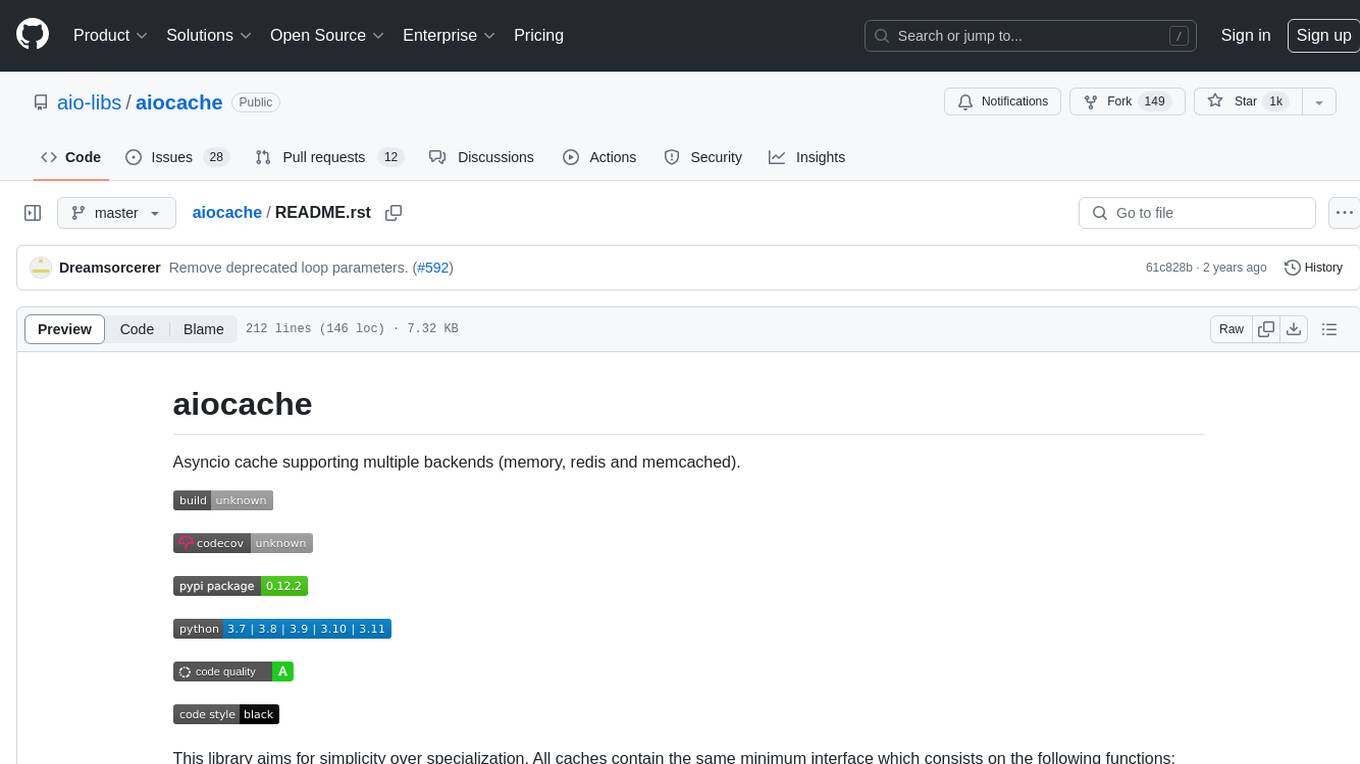
aiocache
Aiocache is an asyncio cache library that supports multiple backends such as memory, redis, and memcached. It provides a simple interface for functions like add, get, set, multi_get, multi_set, exists, increment, delete, clear, and raw. Users can easily install and use the library for caching data in Python applications. Aiocache allows for easy instantiation of caches and setup of cache aliases for reusing configurations. It also provides support for backends, serializers, and plugins to customize cache operations. The library offers detailed documentation and examples for different use cases and configurations.
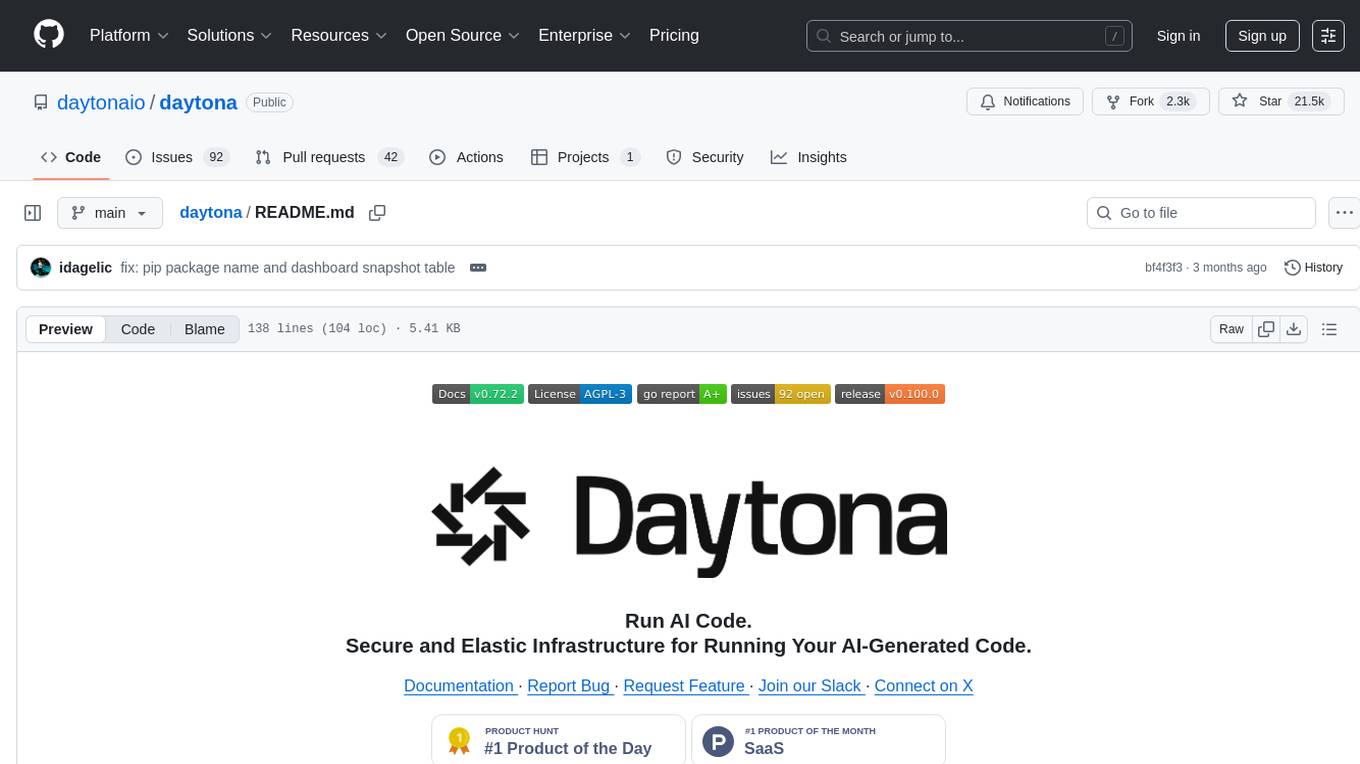
daytona
Daytona is a secure and elastic infrastructure tool designed for running AI-generated code. It offers lightning-fast infrastructure with sub-90ms sandbox creation, separated and isolated runtime for executing AI code with zero risk, massive parallelization for concurrent AI workflows, programmatic control through various APIs, unlimited sandbox persistence, and OCI/Docker compatibility. Users can create sandboxes using Python or TypeScript SDKs, run code securely inside the sandbox, and clean up the sandbox after execution. Daytona is open source under the GNU Affero General Public License and welcomes contributions from developers.
For similar tasks

resonance
Resonance is a framework designed to facilitate interoperability and messaging between services in your infrastructure and beyond. It provides AI capabilities and takes full advantage of asynchronous PHP, built on top of Swoole. With Resonance, you can: * Chat with Open-Source LLMs: Create prompt controllers to directly answer user's prompts. LLM takes care of determining user's intention, so you can focus on taking appropriate action. * Asynchronous Where it Matters: Respond asynchronously to incoming RPC or WebSocket messages (or both combined) with little overhead. You can set up all the asynchronous features using attributes. No elaborate configuration is needed. * Simple Things Remain Simple: Writing HTTP controllers is similar to how it's done in the synchronous code. Controllers have new exciting features that take advantage of the asynchronous environment. * Consistency is Key: You can keep the same approach to writing software no matter the size of your project. There are no growing central configuration files or service dependencies registries. Every relation between code modules is local to those modules. * Promises in PHP: Resonance provides a partial implementation of Promise/A+ spec to handle various asynchronous tasks. * GraphQL Out of the Box: You can build elaborate GraphQL schemas by using just the PHP attributes. Resonance takes care of reusing SQL queries and optimizing the resources' usage. All fields can be resolved asynchronously.

aiohttp
aiohttp is an async http client/server framework that supports both client and server side of HTTP protocol. It also supports both client and server Web-Sockets out-of-the-box and avoids Callback Hell. aiohttp provides a Web-server with middleware and pluggable routing.
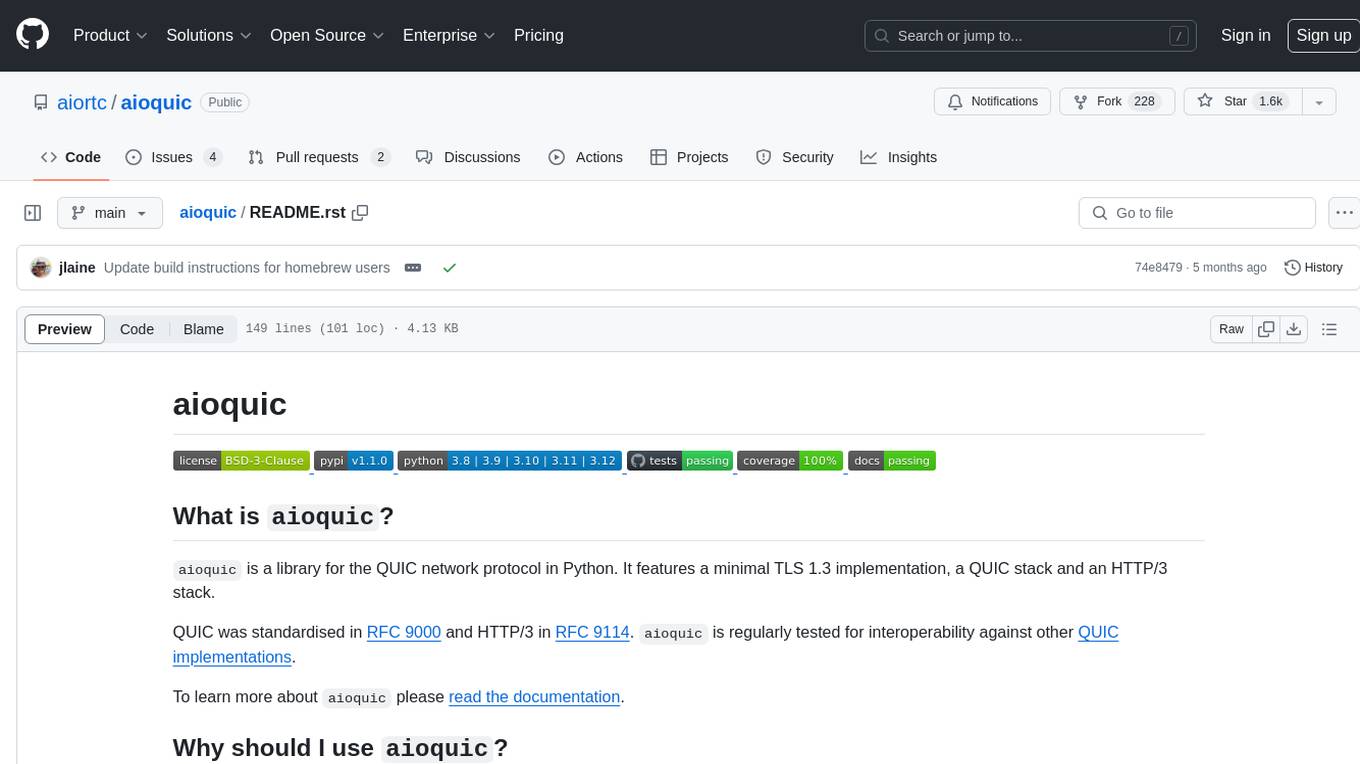
aioquic
aioquic is a Python library for the QUIC network protocol, featuring a minimal TLS 1.3 implementation, a QUIC stack, and an HTTP/3 stack. It is designed to be embedded into Python client and server libraries supporting QUIC and HTTP/3, with IPv4 and IPv6 support, connection migration, NAT rebinding, logging TLS traffic secrets and QUIC events, server push, WebSocket bootstrapping, and datagram support. The library follows the 'bring your own I/O' pattern for QUIC and HTTP/3 APIs, making it testable and integrable with different concurrency models.
For similar jobs

weave
Weave is a toolkit for developing Generative AI applications, built by Weights & Biases. With Weave, you can log and debug language model inputs, outputs, and traces; build rigorous, apples-to-apples evaluations for language model use cases; and organize all the information generated across the LLM workflow, from experimentation to evaluations to production. Weave aims to bring rigor, best-practices, and composability to the inherently experimental process of developing Generative AI software, without introducing cognitive overhead.

agentcloud
AgentCloud is an open-source platform that enables companies to build and deploy private LLM chat apps, empowering teams to securely interact with their data. It comprises three main components: Agent Backend, Webapp, and Vector Proxy. To run this project locally, clone the repository, install Docker, and start the services. The project is licensed under the GNU Affero General Public License, version 3 only. Contributions and feedback are welcome from the community.

oss-fuzz-gen
This framework generates fuzz targets for real-world `C`/`C++` projects with various Large Language Models (LLM) and benchmarks them via the `OSS-Fuzz` platform. It manages to successfully leverage LLMs to generate valid fuzz targets (which generate non-zero coverage increase) for 160 C/C++ projects. The maximum line coverage increase is 29% from the existing human-written targets.

LLMStack
LLMStack is a no-code platform for building generative AI agents, workflows, and chatbots. It allows users to connect their own data, internal tools, and GPT-powered models without any coding experience. LLMStack can be deployed to the cloud or on-premise and can be accessed via HTTP API or triggered from Slack or Discord.

VisionCraft
The VisionCraft API is a free API for using over 100 different AI models. From images to sound.

kaito
Kaito is an operator that automates the AI/ML inference model deployment in a Kubernetes cluster. It manages large model files using container images, avoids tuning deployment parameters to fit GPU hardware by providing preset configurations, auto-provisions GPU nodes based on model requirements, and hosts large model images in the public Microsoft Container Registry (MCR) if the license allows. Using Kaito, the workflow of onboarding large AI inference models in Kubernetes is largely simplified.

PyRIT
PyRIT is an open access automation framework designed to empower security professionals and ML engineers to red team foundation models and their applications. It automates AI Red Teaming tasks to allow operators to focus on more complicated and time-consuming tasks and can also identify security harms such as misuse (e.g., malware generation, jailbreaking), and privacy harms (e.g., identity theft). The goal is to allow researchers to have a baseline of how well their model and entire inference pipeline is doing against different harm categories and to be able to compare that baseline to future iterations of their model. This allows them to have empirical data on how well their model is doing today, and detect any degradation of performance based on future improvements.

Azure-Analytics-and-AI-Engagement
The Azure-Analytics-and-AI-Engagement repository provides packaged Industry Scenario DREAM Demos with ARM templates (Containing a demo web application, Power BI reports, Synapse resources, AML Notebooks etc.) that can be deployed in a customer’s subscription using the CAPE tool within a matter of few hours. Partners can also deploy DREAM Demos in their own subscriptions using DPoC.